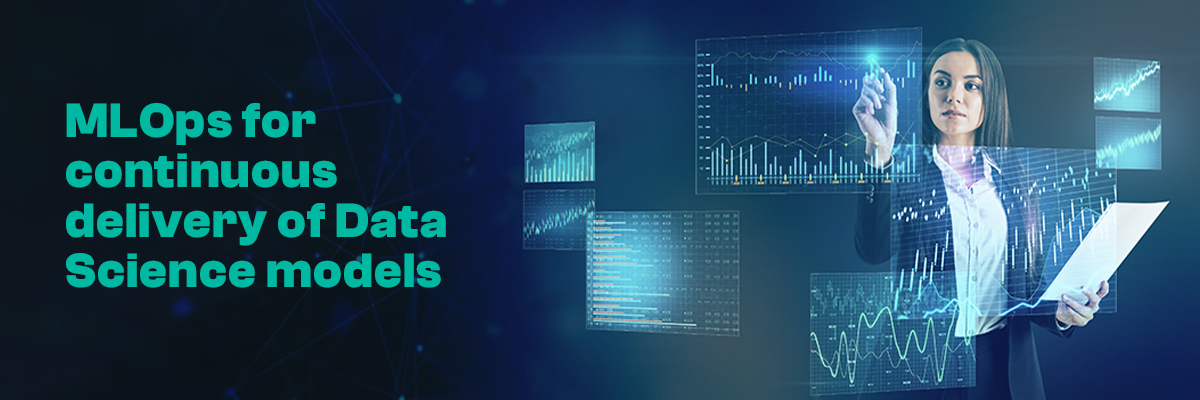MLOps for Continuous Delivery of Data Science Models

Businesses are collecting and generating more data than ever before. From customer interactions to market trends, data is now at the heart of decision-making. This shift is pushing organisations to become more data-driven, using insights from data to improve everything from customer experiences to internal operations. Machine learning (ML) plays a huge role in this transformation, offering powerful ways to predict trends, automate processes, and personalise services.
But while ML models can drive tremendous value, getting them from development to real-world use—and keeping them performing well over time—can be tricky. That’s where MLOps (Machine Learning Operations) comes in. It’s a framework designed to make the process of deploying, monitoring, and continuously improving ML models smoother and more efficient, helping businesses get the most out of their data-driven strategies.
What is MLOps?
MLOps refers to the set of practices aimed at unifying ML system development (Dev) and operations (Ops). Just as DevOps revolutionised software development by integrating development and operations, MLOps brings a similar approach to machine learning. It focuses on automating and improving the process of building, deploying, and monitoring machine learning models.
With MLOps, businesses can ensure that their machine learning models are scalable, repeatable, and adaptive to changes in data and environments, thus supporting the continuous delivery of ML models into production.
The Importance of MLOps in the Travel Industry
Whether it’s predicting demand, managing dynamic pricing, or enhancing customer service, ML models need to be quickly and efficiently deployed to remain competitive.
Without an MLOps framework in place, models may become outdated, underperforming due to changes in user behaviour or market conditions. In contrast, a well-implemented MLOps strategy ensures continuous monitoring and iteration of models, which leads to long-term value creation.
Core Components of MLOps
A strong MLOps strategy integrates various stages of machine learning model development and deployment into a streamlined workflow. The core components include:
1. Model Versioning
Model versioning allows teams to keep track of different iterations of a machine learning model. This is essential for maintaining a history of changes, understanding which versions perform best under specific conditions, and ensuring smooth rollbacks if needed.
2. Automated Model Deployment
Manually deploying ML models can be time-consuming and error-prone. MLOps automates the deployment process, allowing for faster and more reliable rollouts of models to production environments. This automation ensures models are integrated into the business process without disruption.
3. Continuous Monitoring
Once deployed, machine learning models need continuous monitoring to ensure they continue to perform as expected. MLOps helps track model performance in real-time, triggering alerts or retraining workflows when performance drops due to data drift or changes in the environment.
4. Scalability
In the travel sector, user demands can fluctuate significantly based on seasonal trends and external factors. MLOps provides scalability, allowing models to adapt to large datasets or growing customer demands without compromising performance.
MLOps Tools for Continuous Delivery
Several tools are available for businesses to implement an effective MLOps strategy. Below are some of the widely used platforms:
1. KubeFlow
An open-source platform, KubeFlow, provides pipelines for automating the deployment and management of machine learning models on Kubernetes. It enables rapid experimentation and easy management of models.
2. MLflow
MLflow is another open-source tool that supports tracking experiments, packaging models, and managing the deployment process. It is designed to work with any machine learning library and allows for seamless integration into existing workflows.
3. Seldon
Seldon is a platform designed for scaling, deploying, and monitoring machine learning models in production. It emphasises the monitoring of live models, which is crucial for industries like travel, where customer data changes frequently.
Jet2 Travel Technology: Your Partner for MLOps Solutions
As a leader in the travel technology industry, Jet2 Travel Technology understands the importance of staying on the cutting edge of technological solutions. Our team is equipped to help businesses integrate MLOps into their existing workflows, ensuring models are deployed efficiently and maintained continuously. By partnering with J2TT, you can leverage our expertise to enhance your machine learning initiatives, delivering better customer experiences and improving operational efficiency.
Conclusion
MLOps is a critical component of modern data science practices, particularly for industries that rely on real-time data and machine learning models to make strategic decisions. Implementing an MLOps framework helps businesses manage the full lifecycle of their machine learning models, from development to deployment and monitoring.
For businesses in the travel industry, including Jet2 Travel Technology, the continuous delivery of ML models is vital for staying competitive and meeting customer expectations. If you’re looking to enhance your travel business’s technological capabilities, Jet2 Travel Technology is here to help you implement and maintain an MLOps framework that delivers results.
Jet2 Travel Technology: Taking your machine learning models from concept to continuous delivery with ease. Get in touch with us today to learn more about how we can support your data science and machine learning projects.


